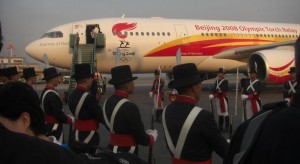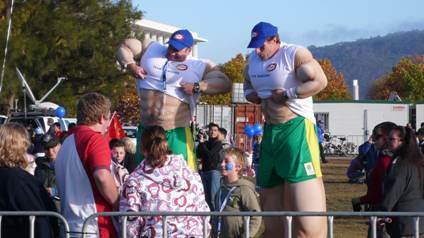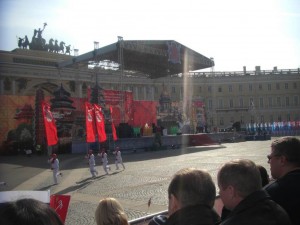Olympics + Violence

I am a business marketer who lived and worked in China in preparation for the 2008 Beijing Olympic Games. As I watch the news coverage today about the upcoming Sochi Games, I am spiraled back to the emotions I had when we approached the Beijing Games. It was an exciting time for me – and, at times, intense. I certainly can imagine how my colleagues in Russia are feeling right now.
After years of preparation for the Olympic Games
– systematically laboring through the work streams of cross-functional and cross-cultural projects and activities, working late into the evenings and always on weekends, and emotionally swinging the excitement with pure exhaustion – all of our planning and preparing fell to the ground when the violence stepped in.
The Olympic Games have a history of serving as a platform for protest and, unfortunately, an opportunity for violent people to act. This was the case during the international leg of the #Olympic Torch Relay for the Beijing Games. Political conflict with the host country erupted in protests and violent threats came in from around the world.
For a corporate sponsor, who paid large fees and invested even larger amounts for activation, these conditions had to be dealt with respectfully and safely – all while continuing to determine how to get the maximum value out of their expensive relationship with the Olympic Games.
Then it hit – the Tibet Unrest exploded emotions around the world.
Just 10 days before the Olympic flame was to travel the world, the global human rights community stepped up their game against the Chinese government. The Olympic Relay, intended to epitomize the Olympic ideals and help brands to connect with cultures, became a flashpoint for protests.
We certainly didn’t want our brand to be associated with the issues, and we tried to appear neutral. For the sponsors and the Olympic organizers, it wasn’t just a public relations nightmare; it was as if our well-intentioned approach of presenting brand values was under fire. Our activity was not only dangerous; it was in jeopardy of being considered indelicate.

We wanted to build excitement for an event, and —
We wanted to pay respect to those chosen to run with the Olympic torch.
But protestors got violent and not only scared us; they caused torchbearers to fear for their lives. Some countries were worse than others and some were not touched by the controversy at all.
The countries that were more open to freedom of speech were also the worst when it came to physical violence. In the U.S., we escaped angry physical mobs and hid in a basement. For the first time, I realized just how scary this marketing effort was going to be. We were provided a police escort to a secret location in the airport before flying to our next destination. In Indonesia the relay was confined to a stadium with only school children allowed in the crowd. And in Vietnam, we were threatened with being arrested if we handed out promotional items.

We experienced some energizing relays too
And when we did, the locals calmed our nerves and cheered us on. My favorite experience was in Argentina. We landed in an empty area of the airport and were greeted by armed guard and pomp and circumstance.
At first I expected to slump down in my seat on the bus but soon realized…nobody was angry at us.
Upon arriving at our hotel we were surrounded by several people lined up on both sides as we walked from the bus to the building. They were clapping and cheering and screaming out, “congratulations!” From then on it only went uphill in Argentina.
But #Sochi — Sochi has a different kind of violence. The chance of terrorist activity surrounding the Sochi Games brings a level of danger and fear with which I can only empathize. In my case, I was surrounded by big people with big guns and tough looking dogs. I walked through metal detectors when I entered venues and hotels, and I was searched at every checkpoint. And, during the relay’s themselves I was often saddened to see that almost everything I planned for and was excited to do had quickly changed or was cancelled.
We all hope nothing bad will transpire in Sochi. But, how do we get beyond the impact of the threat?
Sponsorship is vital to the fiscal success of the Games
…but the same goes for the sponsor! After large investments of crowd and brand activation were swept away, how did sponsors recover?
We certainly had goals of growing brand awareness and tapping into sales opportunities. But, here in the midst of unrest and possible danger, we remembered our 2 core goals.
Goal #1: Communicate Olympic ideals
Goal #2: Whenever possible, give everyone a sensational experience

Canberra, Australia: Samsung knew how to wow the crowds!
We found ways to tell our story; blending sport with culture and education. The Torchbearers were kept safe and honored. When there were crowds, we made sure to put smiles on faces. At times the crowds were not what we hoped for. At times we didn’t have any at all! But we persevered.
Above all, we listened to the Olympic security teams.

St. Petersburg, Russia: Those of us with credentials couldn’t get too close.
Which leads me back to the Olympic Games in Sochi, Russia. I was there back in 2008 during the St. Petersburg Olympic Torch Relay. Instead of cancelling or changing the relay, as many cities did, they stepped up security and implemented a restricted access plan for key venues.
We knew that if we wanted to be safe we needed to listen to our host country and the Olympic security teams. In Russia, we felt safe.
I can only relate to how intense it is in Sochi right now. And I am sure people are not feeling as safe as those located inside the secured ‘ring of steel’ around Sochi. I can also relate with the unfortunate deviations that must be happening with Olympic activation plans.

St. Petersburg, Russia barricades.
For as much as they most likely planned for various scenarios, their minds must be reeling with “what is the tactful next step?”
As a result of my experience, I can offer up this simple yet necessary advice:
#1: Safety trumps all. Be smart about your surroundings and listen to your security teams
#2: Continue to communicate Olympic ideals at every touch point…no matter how small
#3: Try to give everyone involved a sensational experience.
And absolutely, do not give up! It is possible to make your sponsorship pay off, in spite of the violence breathing down your neck.

2 Comments
Stephanie Wiseman
January 30, 2014A great account–your first hand knowledge makes your advice more than just conjecture, rather it’s tried and true: you did it, survived it and succeeded by taking these steps.
I would love to hear your thoughts on the issue of corruption in the Games. With the reports that the #Sochi games are the most corrupt ever, it would seem companies are stuck in the middle: pull out and not participate OR play the corruption game and risk being labelled as corrupt as well.
Lea-Ann
February 3, 2014Thank you Stephanie! It certainly was an adventure that I enjoyed…and at times, didn’t enjoy. Oh – it is not a secret that Russia can be a corrupt nation to deal with in business. Many countries around the world have corrupt business practices, and Olympic efforts in those countries cannot escape it.